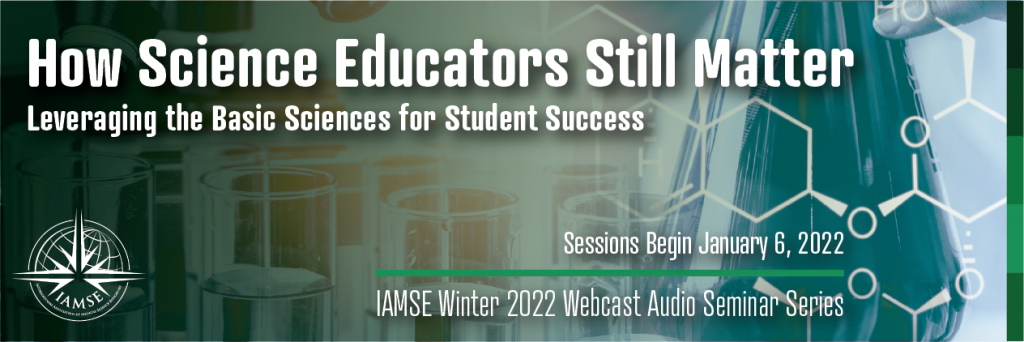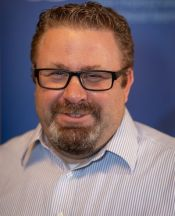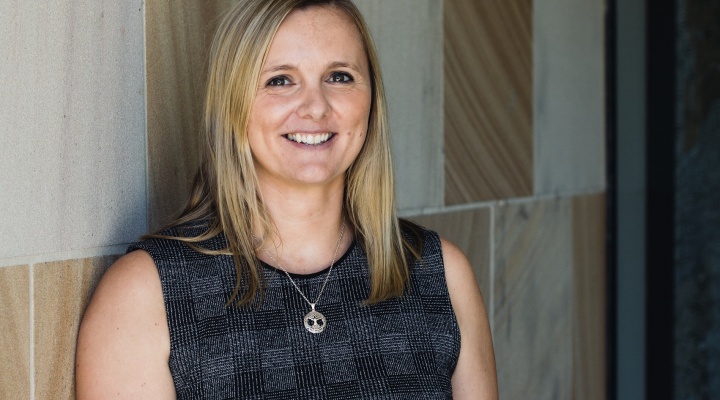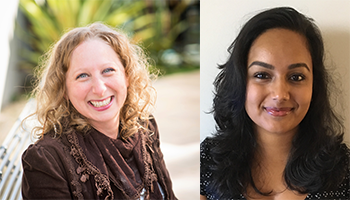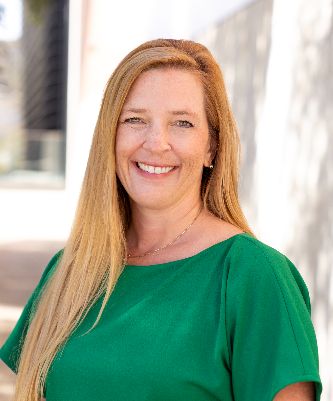[The following notes were generated by Sandra Haudek, PhD.]
The Winter 2022 IAMSE Webinar Seminar Series, titled “How Science Educators Still Matter. Leveraging The Basic Sciences for Student Success” continued with its third seminar on Thursday January 20, 2022, titled “Integrating Basic Science in the Clerkships: Innovative Strategies and Persistent Challenges”. This seminar was presented by Dr. Michelle Daniel, Vice Dean for Medical Education at the University of California San Diego, School of Medicine and former Assistant Dean for Curriculum at the University of Michigan. She discussed the challenges of integrating basic and clinical sciences into core clerkship curricula to promote transfer of knowledge into practice, a main goal of many curricular reforms in medical education. She highlighted innovative instructional and assessment strategies designed to encourage the integration of the basic sciences during clerkships. She also discussed emerging data concerning learner perceptions of basic science integration, noting opportunities and barriers. Her presentation was based on two of her published studies (Academic Medicine, 96(8), 1125-1130; Kercheval et al., Teaching and Learning in Medicine, in press).
Dr. Daniel started with discussing the rationale for basic science integration in clerkships: Since the time of A. Flexner, the basic and clinical sciences have been taught in discreet consecutive blocks, which has led to the compartmentalization of knowledge. The resulting failure to transfer basic science principles into clinical practice negatively impacts diagnostic and management reasoning, as well as clinical outcomes. Over the last years, several institutions embarked on integrating the foundational and clinical sciences across all years of the medical school curriculum using different curricular models. Basic science education in the pre-clerkship years now commonly occurs in the context of clinical cases through a variety of pedagogies. However, incorporation of basic sciences instruction during the clinical years has proven very challenging to systematize. She quoted a 25-year old statement from H. Schmith underlining that this problem is very persistent until today.
Dr. Daniel explained that in medical education, “integration” usually refers to curricular integration that involves the organization of teaching materials in a manner that interrelates subjects frequently taught in separate academic courses or departments. She described three types of curricular integration: (1) Horizontal integration occurs between parallel disciplines, such as anatomy, physiology, and biochemistry that are typically taught in the same phase of the curriculum. (2) Vertical integration occurs between disciplines typically taught in different phases of the curriculum, such as the basic and clinical sciences. (3) Spiral integration refers to a combination of both horizontal and vertical integration that unites across both disciplines and time.
Dr. Daniel then emphasized that a key goal of curricular integration is cognitive integration. Cognitive integration occurs when individual learners appreciate the relationships between foundational science constructs and clinical care, when they understand the cause of mechanisms in context, and when they appreciate the relevance of basic science principles to clinical decision making. This occurs to a process known as conceptual coherence. It is important to understand that curricular integration alone may not achieve cognitive integration. She further cited work by R. Harden who described 11 types of curricular integration on a continuum between two extremes ranging from isolation to complete transdisciplinary teaching and learning. As one moves up the ladder, there is less emphasis on the role of disciplines and an increased requirement for centralized curricular control and collaboration. She mentioned that the strategies discussed in her presentation span multiple rounds on Harden’s ladder and were often developed centrally by curricular committees with input from clinicians and basic scientists.
Dr. Daniel continued with outlining instructional strategies to promote the integration of foundational sciences during clinical clerkships. She stated that such strategies include program level interventions, clerkship level interventions, bedside level interventions, and assessments. Referring to her study, she listed different strategies employed by 11 different medical schools illustrating that a multimodal approach to integration of clerkships is key. The table showed that a few strategies were used by almost all schools, such as emphasizing the basic science content in clerkship didactics, access to question banks purchased by institution, and administration of USMLE Step 1 exam post-clerkships.
First, Dr. Daniel discussed program level interventions, which are central curricular structural changes to increase emphasis on basic science education in the clerkships. These interventions typically require students to leave their clinical teams and return to the main medical school campus. There were 3 common types of program level interventions amongst the 11 medical schools in her study: (1) Multi-week transition to clerkship courses that focused on integrating basic and clinical science applied to patient care, (2) Longitudinal ½ or full day sessions, offered weekly or bi-weekly, dedicated to basic science content, and (3) Week-long science intensives interspersed between clerkships. As an example, Dr. Daniel introduced the Harvard Medical School 5-week pre-clerkship bootcamp that provides a second pass through foundational content while providing clinical context for standardized patient encounters in anticipation of patient care, thus allowing students to consolidate their knowledge and skills from the pre-clerkship curriculum. Clinical case-based instruction provides direct clinical application of basic science principles while demonstrating relevance. The University of Michigan, Vanderbilt University, and New York University offer similar transition courses of varying duration. As a second example, Dr. Daniel showed an overview of the University of California San Francisco’s Foundational Sciences course in which, every other week, all clinical students leave their clerkships and engage in a full day of basic science instruction. The morning session is attended by all clinical students, the afternoon sessions are clerkship specific. The sessions focus on high yield foundational science topics relevant to all clerkships such as shock, infection, pain, cancer, hemostasis & thrombosis, and aging. The University of Michigan, the University of Pennsylvania, Baylor College of Medicine, and Florida International University have similar longitudinal basic sciences curricula during their clerkships, yet their foci are slightly different ranging from emphasis on USMLE content, to application of the scientific methods, to evidence based medicine.
Second, Dr. Daniel discussed clerkship level interventions, which are departmentally based activities that highlight basic science as an integral part of clerkship education activities. The most common type is emphasizing basic science content in clerkship didactics. As an example, the University of Wisconsin uses case-based learning with online modules in which students are expected to review an online model prior to each case-based learning session and that focused on the basic science content underpinning the case. An interdisciplinary team of faculty developed over 300 new interactive electronic resources to support these sessions. Another school uses multidisciplinary clerkships dedicated to applied science. As a third example, Dr. Daniel described the 12-week surgery and applied science clerkship at the University of Michigan that is comprised of 4 weeks of general surgery, 4 weeks of a surgical subspecialty, and 4 weeks of pathology, radiology, advanced anatomy, and anesthesiology. Case-based teaching sessions are integrated across the 12 weeks with all the disciplines involved in their planning and implementation. The 4 weeks of applied science allows students to explore basic science linkages at a more relaxed pace while allowing added time to prepare for the surgical shelf exam. Dr. Daniel then showed a table that provided more details: In the anatomy portion, students return to the lab to engage in dissection. During the anesthesia portion, students spend time learning about cardio pulmonary physiology and pharmacology, including mechanisms of action of anesthetics and analgesic medications used for pain management. They also spend time in the operating room for asking questions and participating in patient care. In the pathology portion, students review normal histology, participate in clinical pathology sign outs and slide reviews, as well as observe an autopsy. In the radiology portion, students interpret clinical images in the reading room, including cardiothoracic, abdominal, neuro, and musculoskeletal plane fills, CT scans, and MRIs. They also observe interventional procedures.
Third, Dr. Daniel discussed bedside level interventions, which are point of care activities that directly connect caring for patients with basic science principles. She pointed out that faculty development and preparation was key, as practicing clinicians are often nervous about teaching basic science concepts because they feel they lack expertise or the are distant from the content. As an example, Dr. Daniel discusses the process at the University of Michigan: They encouraged clinicians to develop basic science teaching scripts. These are 5 to 10 minute, pre-prepared basic science chalk talks. The clinicians draw on then when appropriate. Today, APGO (www.apgp.org/basicscience) has a repository of OBGYN mini modules for pre and post USMLE step 1 questions that can either be used by educators as teaching scripts or by students for self-directed learning. As a second example, Dr. Daniel mentioned the Uniformed Services University of the Health Sciences, which introduced a form of self-directed learning component that encourages students to develop and research a clinically relevant question related to the basic sciences.
Dr. Daniel then continued with outlining assessment strategies to promote the integration of foundational sciences during clinical clerkships. Assessment strategies include low stakes formative and high stakes summative assessments. As an example, the New York University developed a clinical science inquiry mobile platform for integrating clinically relevant basic science concepts into the core clerkships. As a second example, the Uniformed Services University of Health Sciences developed an approach that leverages the principles of space based education, in which students receive basic science questions related to identified weaknesses that are repeated at random intervals until they are correctly answered twice. In general, most schools offer access to third party question banks for USMLE step 1 preparation. Summative assessments in the form of customized NBME basic science exams or comprehensive basic science exams were used by the University of Wisconsin, New York University, the University of Michigan, and the University of California San Francisco. All schools in this study placed USMLE step 1 after the clerkships to use the motivation of that major national assessment to help drive integration. As another example, Dr. Daniel detailed the clinical science inquiry platform used by the New York University. This platform was constructed based on principles of just-in-time learning and situated learning theories. Questions were curated by a team of clinicians and basic sciences scientists for each clerkship. The application sends students 2-3 questions per week based on their clerkship schedule. Each question begins with a clinical vignette and includes high quality graphical elements. Questions take about 10 minutes to answer, so they fit into the busy schedule of a clerkship student. Question completion is tracked centrally but responses do not contribute to a student’s formal grade.
Dr. Daniel then eluded to spaced repetition of assessment as an educational principle leveraged by homegrown question banks as well as numerous third-party vendors, which comprise a lot of the informal clerkship assessment system. These platforms are embraced for their value for learning basic science content related to USMLE step 1 performance and ease of use during busy clerkship rotations by students.
Dr. Daniel further explained that the post-clerkship administration of USMLE step 1 is an assessment strategy used by all 11 schools to attempt to facilitate cognitive integration. Delaying USMLE step 1 until after clerkships encourages students to review basic science concepts overtime directly connected to patient care. It also fosters cognitive integration during the USMLE step 1 study period after students have had more extensive exposure to patient care and have a cadre of illness scripts in their repertoire. Dr. Daniel explained that her group collaborated with the NBME to perform multiple studies evaluating the impact of post-clerkship USMLE step 1 administration: In their first study, they found that the mean USMLE step 1 scores increased and fewer students failed after moving the exam to post-clerkship. In their second study, they found that after rising national USMLE step 2 scores were accounted for, there were no significant differences in USMLE step 2 scores or failure rates. In their third study, they found that shelf scores decreased, particularly in medicine and neurology, while OBGYN and psychiatry shelf scores largely remained unchanged. They concluded that performance on clerkships taken earliest in the sequence were most affected and differences gradually disappeared with subsequent examination as students gain clinical experience. In summary, the outcomes of moving USMLE step 1 after the core clerkships demonstrate noninferiority when it came to USMLE step 1, step2, and CSE scores.
Dr. Daniel then debated the question if the post-clerkship USMLE step 1, or if curricular integration strategies during clerkships, or if both promote cognitive integration? To explore this question, her team engaged in another study in which they collected student perspectives on basic science integration, including barriers and facilitators. This study was performed at the University of Michigan and the University of California San Francisco with 33 students participating in 6 focus groups and a thematic analysis of their responses. They found that pulling students off their clerkships for full or half-day basic science instruction was not an effective integration strategy (longitudinal returns to basic science). Many students reported tuning out during these sessions and focusing on studying clinical materials instead. They also found that clerkship didactics and bedside teaching in which basic science was explicitly linked to patient care promoted cognitive integration and made content stick. Even a year after completing clerkships, students were able to recall multiple specific examples. Further, they found that clerkships with applied science components, as well as subspecialty rotations on medicine and surgery clerkships were quite effective at driving cognitive integration. Lastly, they found that the placement of USMLE step 1 after the core clerkships had mixed impacts on cognitive integration during clerkships. When students began their clerkships, they did not have the benefit of knowledge consolidation that often occurred during the USMLE step 1 study period. The students felt like their science foundation was on shaky ground, making learning more challenging. Later on however, students were poised to take advantage of the dedicated USMLE step 1 study period, having clinical experience to facilitate cognitive integration. In summary, their study showed that barriers included their tenuous basic science foundation as a result of both shorted pre-clerkship curricula well as the lack of the pre-clerkship USMLE step 1 to consolidate knowledge. Cognitive overload and demands on time during clerkships led students to prioritize clinical over basic science learning. Basic Science was often perceived as irrelevant to patient care due to lack of explicit connections by educators. Educators also focused on teaching clinical science to the exclusion of basic science, and longitudinal basic science curricula were often perceived as well intended but somewhat disconnected from clinical care. Facilitators of integration included basic science instruction explicitly linked to patient care, either at the bedside or via clerkship didactics. Some specialties or disciplines that demonstrated direct application of basic science to clinical care were valued. A post-clerkship USMLE step 1 exam with a dedicated study used as an opportunity to revisit basic science once a clinical foundation has been established was a facilitator of cognitive integration.
Dr. Daniel summarized: Integration can overcome compartmentalization of knowledge and facilitate transfer into clinical practice. A key goal of curricular integration is cognitive integration, yet one does not necessarily produce the other. Strategies to integrate basic science in the clerkship include program-, clerkship-, and bedside- level interventions as well as assessments. Longitudinal returns to basic science that pull learners off clerkships are largely ineffective. Students emphasize the value of explicit basic science teaching directly linked to patient care; and this is where we need a lot more investment. Students note the dedicated post-clerkship USMLE step 1 study period is an ideal opportunity for cognitive integration once a strong clinical foundation is established.
The presentation lasted about 35 minutes and a rich discussion followed. 4th-year student Nicole Mott, a leading collaborator of her study team, joined Dr. Daniel. Among other topics, questions from the audience addressed: placement of transition courses to clerkships, how to better train faculty to integrate basic science better during clinical activities, how can basic science faculty be more effective, is there feedback from clerkship faculty on student performance, optimal timing of USLME step 2, how are basic science concepts bets integrated into post clerkship training, and transfer of basic science knowledge from one case to other cases.
